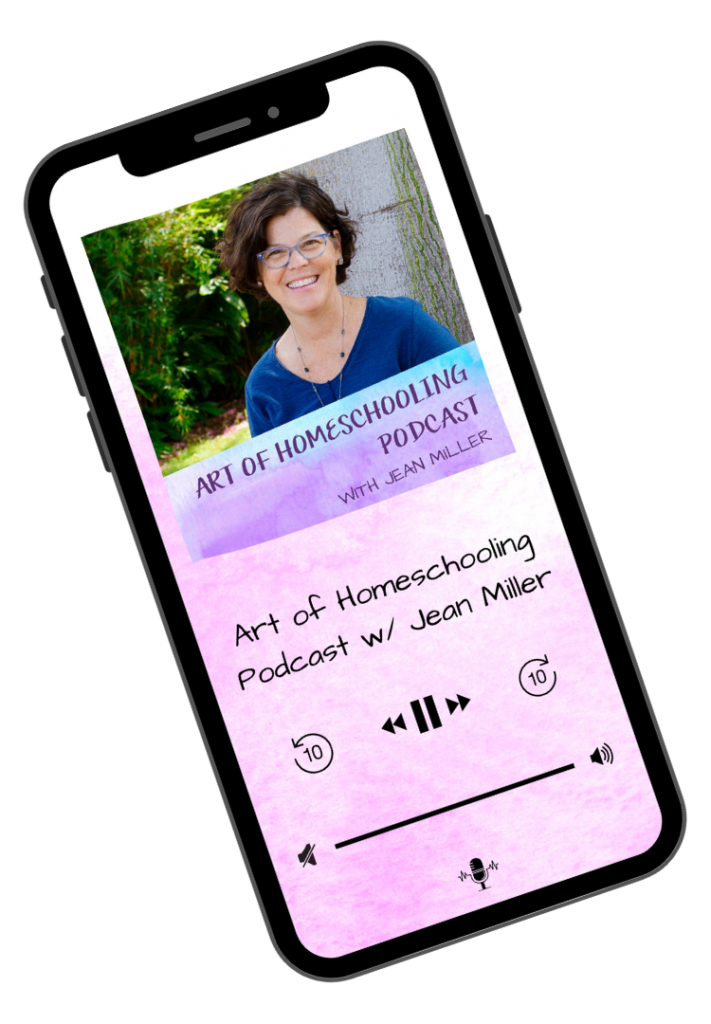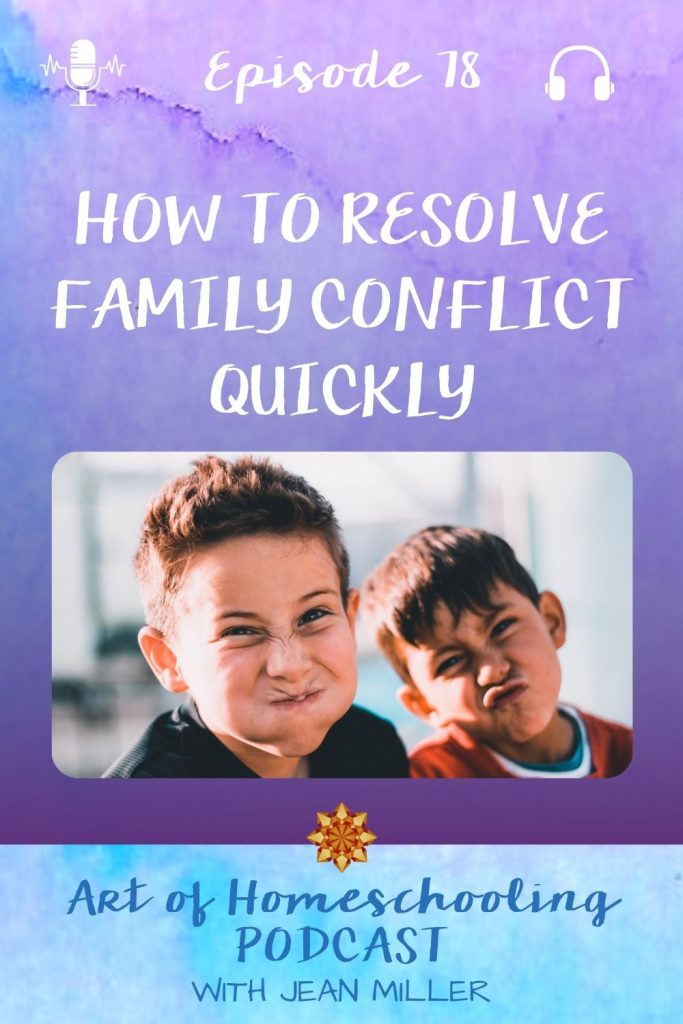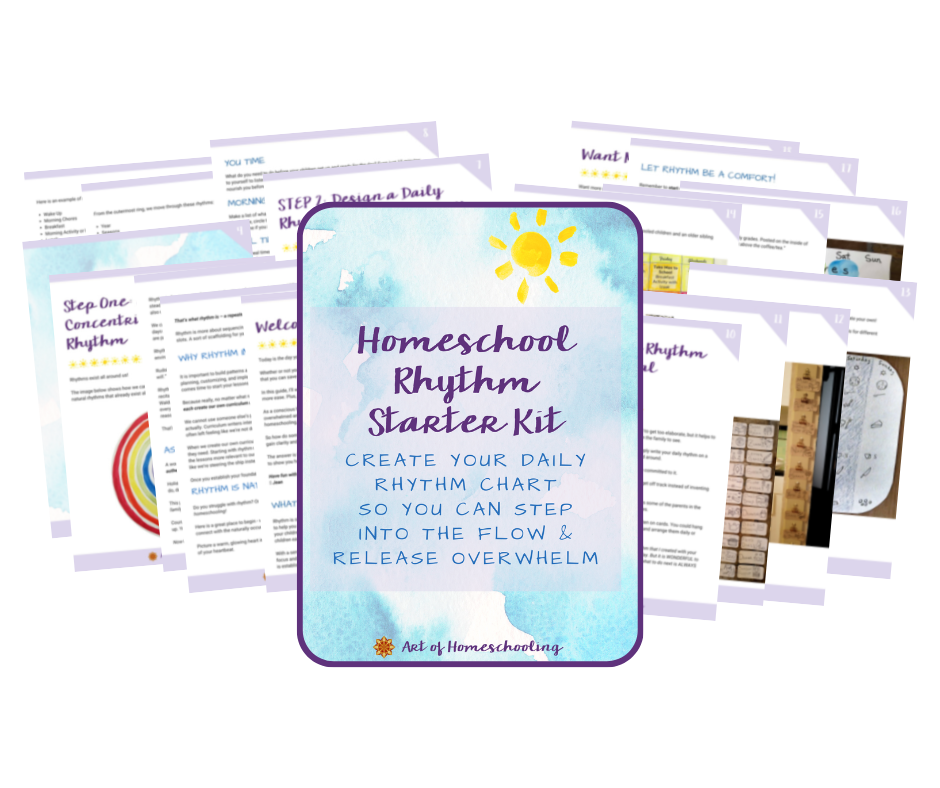Episode 78
Welcome to Episode 78 here on the Art of Homeschooling Podcast. We’re talking all about how to resolve conflict in your family quickly.
I know conflict isn’t an easy subject. Arguing and bickering can really wear us down and sometimes we wish it would just go away. Therefore we’d rather not deal with it.
Other times, we fall into the trap of thinking that if we’re perfect parents or homeschoolers, conflict will never happen.
When my boys were little, I read all kinds of books on this subject. But the thing that helped me the most was to develop a few practical ways of responding to conflict. Strategies and skills that we could come back to again and again in our family.
How to Resolve Conflict in Your Family Quickly
So here I’m sharing strategies and skills with you. I have 8 strategies to help you resolve conflict in your family quickly. So that it doesn’t keep wearing you down.
Let’s jump in!
1: Accept that family conflict will happen
Because it’s normal and it’s the repair that matters!
Often we have the most conflicts with those we are the closest to. It’s just the nature of the game of life!
We show up as our most vulnerable and true selves with those we love the most. And that’s a good thing because it’s a sign of trust and feeling of safe.
The reality is though, that conflicts will arise. Because we’re all different! The world would be a very boring place if we were all the same.
But when we fool ourselves into thinking that if we are the best parents we can be and that our children will never argue or there will never be conflict in our family, we’re doing ourselves a disservice.
We won’t always agree. Somedays, we’ll be tired and cranky and snap back quickly. Somedays, our children will fight.
Once we can accept that, we have a better chance of helping resolve conflict. We can remove the added layer of blame and judgement. It all starts with acceptance.
2: Focus on serving something bigger than yourself
So often when conflict arises, we tend to go down the blame path, trying to figure out whose fault it was and scolding them.
But honestly, in almost every conflict, each party is usually partially right and partially to blame.
So rather than playing the blame and shame game, it’s much better to take a moment to focus on something bigger than yourself.
Thinking about your family values of connection and closeness can help you stay committed to working things out peacefully.
Remembering that there is a higher power, whatever you believe in, can help us be more gentle and understanding and forgiving.
3: Write out 20 things you’re grateful for
Science shows that gratitude can boost the neurotransmitter serotonin and activate the brain stem to produce dopamine. Dopamine is our brain’s pleasure chemical. The more we think positive, grateful thoughts, the healthier and happier we feel.
Gratitude is a powerful human emotion. And gratitude breeds more gratitude.
“Enjoy the little things. For one day you may look back and realize they were the big things.”
~Robert Brault
4: Take a break before your respond
Walk into another room and count to 10.
I have a “five breaths” bracelet with five stones to touch and count as you take five deep calming breaths.
Downpour
Seven Times the Sun, Shea Darian
When I am sad,
I want to cry
a puddle,
a river,
an ocean
of tears.
A downpour:
my sadness
my anger
my fears…
Then the storm rolls over,
and a rainbow appears.
5: Try a Mommy’s time-out chair
My boys are 16 months apart, so as you might be able to guess, there was a lot of wrestling and noise! They would be playing beautifully one moment, building with blocks, sharing and cooperating. And then the next moment, there would be grabbing and yelling.
I’ll be the first to admit I didn’t always handle these outbursts well.
But one thing I did discover very early on was that rather than try to put one of them in time out, it was better to put myself in time out.
Once I made sure they were safe, I would go take a few minutes in Mommy’s time out chair in the corner of our bedroom. I highly recommend it!
6: After everyone has calmed down, reconvene and problem solve
Ask, “How can we resolve this so that everyone’s needs are met?“
The key here is to let everyone share their side of the story. And then invite brainstorming. Keep going until everyone feels like you’ve found a solution that is agreeable to all.
These sessions often start with, “Well, he could share that Lego guy with me!” And the best response is often “That’s one idea, what’s another?”
Keep going. Let everyone feel heard. This activity in itself often helps calm the storms. Especially if you throw some crazy outlandish ideas out, like “We could throw all the Legos in the trash.” That’s one idea, what’s another?!
7: Use a talking stick
So that you don’t interrupt each other and everyone feels heard.
One really important rule for conflict resolution is no interrupting each other.
A talking stick or rock or some tangible item that the person talking can hold really helps.
Then when someone starts to interrupt, the speaker can simply hold up the stick and keep going until they’ve said their peace.
8: Use “I” statements instead of “You” statements
My last strategy is to use I statements rather than you statements because this helps to remove the blame and judgement.
For example, “I feel frustrated when you grab a block I was using.”
The next step would be to add a question to that statement: “Would you please ask me first the next time?”
You Can Resolve Family Conflict Quickly
So there you have it, my 8 strategies to help you resolve conflict in your family quickly. I hope you found these ideas helpful.
For More Help Along the Way
Don’t forget, if you find you need more help sorting this all out in your family, I can help you with a one-on-one mentor session.
I help homeschoolers with family conflict along with homeschool support on the daily. So if you find you need more help sorting all this out in your family, you’ll find all the details on how I could help you here.
Rate & Review the Podcast
If the Art of Homeschooling Podcast has inspired you, I’d LOVE it if you could rate and review the podcast on your favorite podcast player! Reviews can be left on Apple Podcasts (iTunes), Podcast Addict, or Stitcher.
Or simply pop on over to lovethepodcast.com/artofhomeschooling and choose where you want to leave your review.
And if you want to show your appreciation for the Art of Homeschooling Podcast, you can buy me a coffee!
Never Miss an Episode!


Check Out All the Episodes Here
And save or share this encouragement on Pinterest with the image below.




